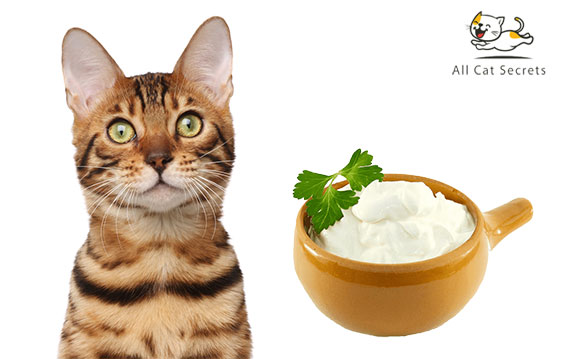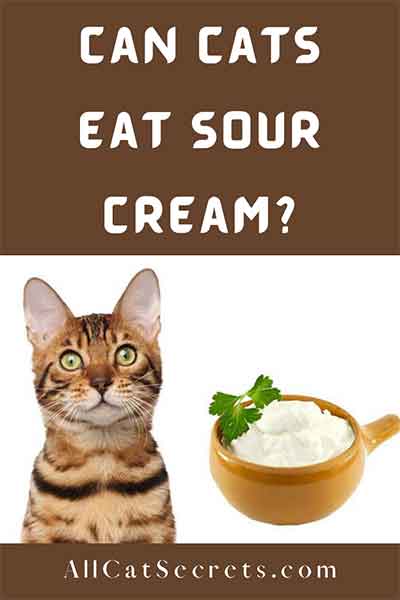You momentarily stepped out of the kitchen and unintentionally left your tin of sour cream uncovered, only to get back to the surprising discovery that your cat has helped himself to a decent amount of sour cream.
As a concerned pet parent, your first instinct is to wonder whether the cat will become sick from snacking on sour cream. That’s especially if your adorable kitto is having this food for the first time. But can cats eat sour cream?
The short answer is yes, cats can safely eat sour cream. Sour cream doesn’t contain any compounds that could become immediately toxic to cats. If administered correctly, the food might even benefit your cat in some way.
However, several factors go into determining whether sour cream will actually be good for your feline friend or not.
There shouldn’t be any cause for alarm if your cat only took a few licks of sour cream. But it’s worth noting that sour cream is inherently a dairy product and cats are generally lactose intolerant. Therefore, ingesting large amounts of sour cream could leave your four-legged feline companion nursing various gastrointestinal symptoms.
Another issue with sour cream for cats relates to the often-high fat content in these foods.
Read on as we dissect all the possible interactions between cats and sour cream. Some of the aspects this post will unpack include the pros and cons of sour cream for cats.
Table of Contents
What Is Sour Cream?
Sour cream, also known as soured cream in British English, is a dairy product obtained through the fermentation of regular cream using certain types of lactic acid bacteria.
The name ‘sour’ comes from souring – the process where lactic acid is produced by fermentation. The fermentation process will occur naturally if sour cream is subjected to certain environmental conditions and left unattended for a reasonable duration.
But in most cases, the process is induced via the manual introduction of bacteria into the cream. In addition to making cream sour, the lactic acid bacteria may also thicken the cream.

Sour cream comes in different varieties. Examples include regular sour cream, light sour cream, and fat-free sour cream. The cream may also differ depending on the specific region of the world it’s prepared.
Another thing worth noting is that not all sour creams are necessarily sour to the taste. The overall flavor may be milky with a slightly acidic tang, similar to that of Greek yogurt or crème Fraiche. However, the actual taste depends on the amount of lactic acid bacteria in the cream.
But perhaps the most exciting thing about sour cream is its diverse application. Considered one of the most versatile dairy products, sour cream can be consumed as is or used as a topping for stews, soups, nachos, and tacos. You can also use the cream as a base for various dressings and dips, such as spinach dip, onion dip, ranch dressing, etc.
But the question remains, can I give my cat sour cream?
Sour cream may offer certain health and nutritional benefits to your cat. But being a dairy product, the cream might also prove harmful to your kitto. The subsequent sections will attempt to expound on the pros and cons of sour cream for cats.
- High protein cat food dry formula with real chicken as the first ingredient
- Natural with prebiotic fiber nourishes specific intestinal bacteria for digestive health
- Wholesome cat food dry kibble with vitamin A and Omega-6 fatty acids to nourish skin and coat
Last update on 2025-02-16 / Affiliate links / Images from Amazon Product Advertising API
Can Sour Cream Benefit Your Cat?
To understand how your cat might benefit from sour cream, it’s important to know the composition of this dairy product.
Now, sour cream typically contains protein, fat, calcium, and potassium as the primary ingredients. But depending on how the milk is processed, there may be a wide list of additives too.
Common ones include modified food starch, sodium citrate, sodium phosphate, calcium sulfate, potassium sorbate, carrageenan, guar gum, and locust bean gum. The pros and cons of sour cream depends on each of these constituent ingredients.
Below are the main nutrients in sour cream that your cat may benefit from;
1. Protein
Protein forms the building blocks of an animal’s tissues, muscles, and organs. It’s unarguably the most essential nutrient.
The fact that cats are obligate carnivores who thrive mainly on animal protein means they can also benefit immensely from the protein obtained from sour cream. That’s because sour cream is inherently an animal-derived product.
2. Calcium
Calcium strengthens, in addition to aiding the normal growth and development of, bones and teeth.
Giving your cat calcium-rich foods like sour cream is an excellent way to protect the animal against degenerative bone illnesses, such as feline osteoporosis and feline osteoarthritis.

3. Potassium
Potassium is another powerful mineral in sour cream that your feline friend could benefit from. Potassium helps maintain the body’s normal electrolyte balance. The mineral can counteract the adverse effects of sodium in your cat’s body.
More on sodium’s negative effects in the next section.
Potassium is also noted for its role in regulating blood pressure and heart rate. Diets rich in potassium may help reduce the risks of hypertension and stroke, making the mineral instrumental in maintaining your cat’s heart health.
In addition to the above health and nutritional benefits, you can also use sour cream to administer medication to your cat. All you need to do is hide the tablets in a slice of cream and offer the cream to your cat.
Is Sour Cream Safe For Cats?
We’ve just highlighted several potential health and nutritional benefits of sour cream for cats. But does that make sour cream safe for cats?
Again, sour cream is perfectly safe for cats if fed in small portions. Your feline friend will only enjoy the beneficial nutrients in sour cream if you practice moderation.
Too much sour cream could be harmful to your cat, as highlighted in the section below.
- CONTAINS: This pack of Delectables Squeeze Ups contains 32 (0.5 ounce eaches) squeezable cat treat tubes.
- INTERACTIVE TREATING: Squeeze Ups provide the purrfect bonding experience between you and your cat – this playful & interactive...
- PUREE TREATS: Each lickable treat tube is stuffed with a thick and creamy puree treat that is made from real poultry and fish.
Last update on 2025-02-15 / Affiliate links / Images from Amazon Product Advertising API
Issues With Sour Cream for Cats
1. Risks of Weight Gain
Sour cream, as with all dairy products, are high in fat. Although cats need some fat in their diets to aid energy synthesis, fatty foods like sour cream may induce unintentional weight gain. Without timely intervention, your cat could become fully obese or overweight.
The high fat content in sour cream might also trigger or worsen pancreatitis. Pancreatitis is an inflammation of the pancreas, an organ instrumental in secreting various digestive juices. The condition can cause unbearable abdominal pain for your cat, in addition to a host of other gastrointestinal symptoms like vomiting and diarrhea.
Last but not least, high-fat diets like sour cream might impact your cat’s cardiovascular system adversely. An unchecked release of fat into your cat’s bloodstream could mess up the animal’s blood cholesterol levels, thereby opening him up for heart and cardiovascular diseases.
2. Lactose Intolerance
Most cats, if not all, are lactose intolerant. Lactose is the main sugar in dairy products.
Lactose intolerance is caused by the absence of the enzyme lactase that breaks down lactose in the body.
It’s worth noting that cats are not necessarily lactose intolerant from birth. Kittens are able to digest lactose as they have the enzyme lactase.
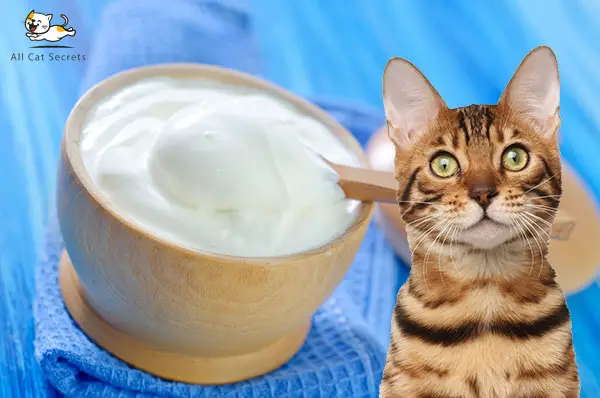
However, cats generally stop secreting lactase after weaning and their capability to release this enzyme diminishes with age. That explains why older cats tend to experience more severe symptoms of lactose intolerance than their younger counterparts.
Common signs of lactose intolerance in cats include;
- Nausea and vomiting
- Appetite loss
- Diarrhea
- Constipation
- Dehydration, marked by dry eyes and gums
- Flatulence – excess gas,
- Bloating
- Abdominal discomfort
- Polydipsia or increased thirst sensation
Can kittens eat sour cream then?
Having mentioned that cats become lactose intolerant as they age, you may now be wondering if kittens can safely eat sour cream.
Unfortunately, sour cream is just as potentially harmful to kittens as it is to older cats. In fact, kittens may suffer more severe adverse effects of sour cream owing to their more sensitive stomachs. Besides, sour cream still contains a number of other compounds that make it potentially toxic to kittens and mature cats alike.
3. Sensitivity to Casein
Casein is one of the two main proteins in sour cream, the other one being whey. In fact, casein makes up the majority of the total fraction of dairy products, sometimes up to 80% in sour cream.
While animal protein is generally good for cats, some cats may suffer allergic reactions to casein. Such cats will experience severe reactions from exposure to dairy products, including sour cream.
Some of the side effects of casein protein allergy include;
- Coughing
- Sneezing
- Wheezing
- Itchy skin
- Hives
- Facial or throat inflammation
- Kidney-related Complications
Unprocessed sour cream may have insignificant amounts of salt. But like all refined dairy products, processed sour cream might contain brine (concentrated sodium chloride) and other sodium-based salts, such sodium citrate and sodium phosphate.
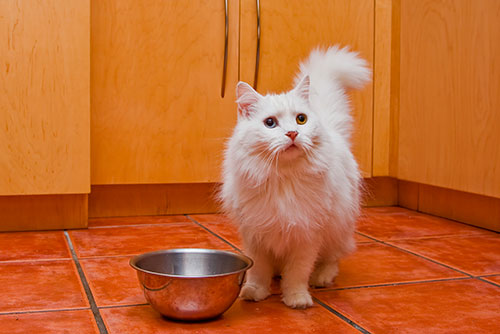
Salt is ranked among the numerous human condiments that cats shouldn’t eat. Exposure to too much salt could trigger sodium ion poisoning, a condition that can take a toll on your cat’s kidney.
Sodium ion poisoning is precisely the reason cats with kidney disease shouldn’t eat sour cream and other salt-laden foods. Common signs of this life-threatening disease include;
- Intense thirst followed by excessive drinking and urination
- Bowel movement disorders like excessive diarrhea or prolonged constipation
- Labored breathing
- Fever
- Elevated heart rate
- Fatigue
- Seizures and coma due to the bursting of blood vessels causing fluid build-up in the brain
Is Sour Cream Bad For Cats?
Sour cream boasts animal protein, which happens to be the main nutrient that cats require in their diets. The cream also contains other useful minerals, including calcium and potassium.
If we dwell on these factors, it’s logical to conclude that sour cream is good for cats. But almost everything with benefits must have its drawbacks.
For instance, sour cream doesn’t constitute your cat’s natural diet. The cream is also laden with several compounds that could prove harmful to cats. Examples include fat, casein protein, and excess salts (in the case of processed sour cream).
So, the decision to offer sour cream to your cat is purely personal. But should you choose to feed this dairy product to your kitto, remember to exercise moderation.
- CONTAINS: This pack of Delectables Stew contains twelve (12) 1.4-ounce lickable cat treats.
- CATS LICKS THE BOWL CLEAN: These stew cat treats combine tender chicken or succulent fish with a hearty and rich sauce for a cat...
- TASTY TEXTURE FOR CAT TREATS: The meat and sauce are entangled in this tasty wet texture, ensuring your kitty eats the whole cat...
Last update on 2025-02-15 / Affiliate links / Images from Amazon Product Advertising API
Can Sour Cream Kill Cats?
Sour cream doesn’t contain any known toxic chemicals that could trigger an immediate medical emergency in cats. So, your cat won’t drop dead after licking on this yummy treat.
But as you may have gathered by now, the extent of sour cream toxicity in cats depends on the quantities consumed. While small amounts of sour cream won’t be injurious to your four-legged feline friend, a considerable quantity might cause life-threatening side effects.
Do Cats Love Sour Cream?
It’s not unusual to find a cat owner wondering, why does my cat love sour cream?
Cats indisputably love cream and various other forms of dairy products. Movies and YouTube videos abound of cats who couldn’t hesitate to take a lick off a tin of cream.
So, it’s likely that your cat will be drawn to sour cream than repelled by it. That makes interactions between cats and sour cream more frequent.
However, the fact that cats are fascinated by dairy products doesn’t necessarily mean your kitto will develop an instant love affair for sour cream. In fact, the texture of sour milk will repel many cats.
Besides, cats have fewer taste buds. And while these animals can taste sour taste, they’ll not perceive sour-tasting foods as intensely as humans do.
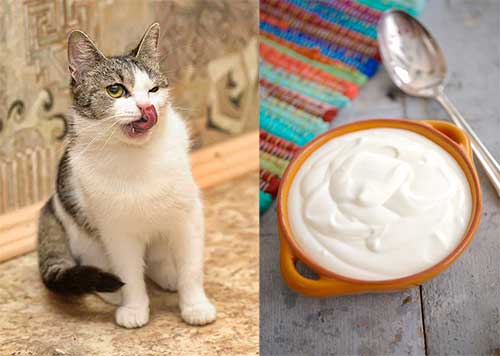
How Much Sour Cream Can You Feed Your Cat?
There’s no such thing as the exact amount of sour cream to feed your cat. The most prudent advice would be to avoid giving your feline friend sour cream and dairy products in general.
But if you must experiment with sour cream, practice moderation. Start with, say, a quarter tablespoon of sour cream and mix the cream into your cat’s regular food. Then, observe the animal over 24 hours for any adverse effects before deciding to increase or reduce the portions.
Perhaps the more pressing matter to settle here is knowing what to do if your cat ate sour cream. According to veterinary officers, your best bet is to take your cat for a professional checkup if you suspect he has consumed worrying amounts of sour cream.
Other Frequently Asked Questions Regarding Cats and Sour Cream
Can cats eat sour cream and onion chips?
Sour cream may not be immediately toxic to cats in small amounts. But onion is. Therefore, cats shouldn’t eat sour cream and onion chips.
Indeed, one of the commonly-reported cat-related concerns is, ‘my cat ate a portion of a sour cream and onion chip, will he be fine?’
Onions and all spices in the allium family are potentially dangerous to cats. So, it’s important to book an appointment with your vet the moment you suspect your cat has consumed sizable portions of sour cream and onion chips.
Can cats eat sour cream and chives?
Chives belong in the allium family, the same family as onions and garlic. As we’ve seen, all herbs in this family are potentially harmful to cats. So, cats shouldn’t eat sour cream and chives.
Can pregnant cats eat sour cream?
Pregnant cats should avoid sour cream due to their rather compromised immunity. The same logic holds true for nursing cats and sick cats.
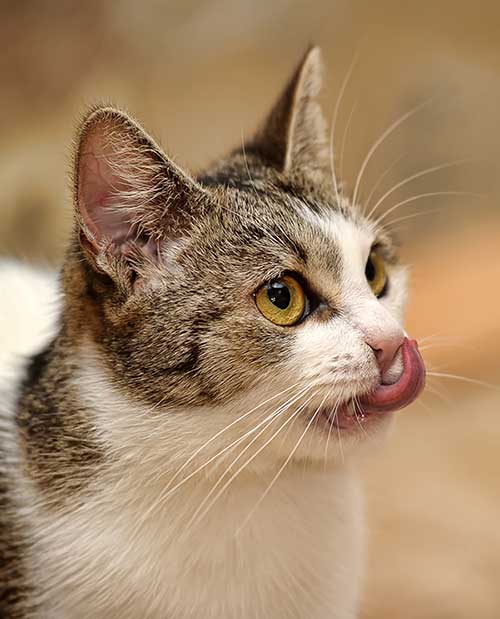
Conclusion: So, Can Cats Have Sour Cream?
Small amounts of sour cream won’t cause any immediate harm to your cat. In fact, sour milk might even benefit your cat if carefully administered.
However, avoid making sour milk (or any dairy product for that matter) part of your cat’s regular meal rotation.
Checkout Our Favorite Cat Products
1. Best Online Course For Cat Parents
Our favorite: The Cat Language Bible (How to Finally Understand And Speak to Your Cat) – A new form of cat to human communication that many cat owners have dreamed about… but few have actually thought possible.
2. Best Immune Support For Cats
Our favorite: Tomlyn Immune Support – Best Supplement for Cats and Kittens.
3. Best Cat Treats
Our favorites: LIFE ESSENTIALS All Natural Freeze Dried Chicken And Sheba Meaty Tender Sticks – Both are Great.

